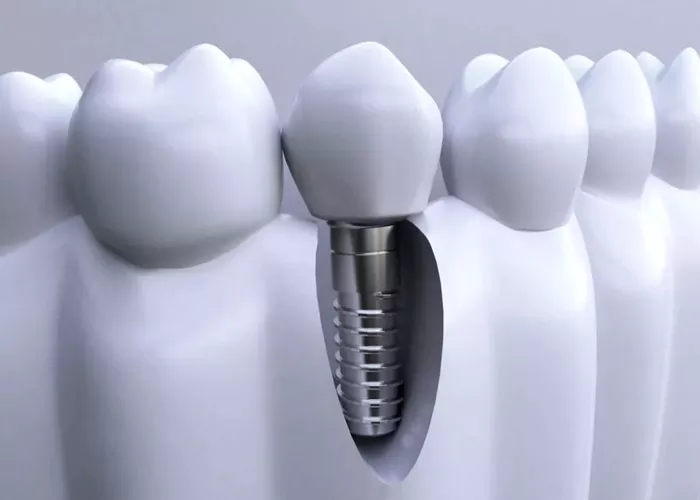Dental implants and dentures are both solutions for replacing missing teeth. Dentures have been around for a long time and are a removable appliance that can replace multiple missing teeth or, in some cases, all teeth in an arch. Dental implants, on the other hand, are a more modern approach where a titanium or zirconia post is surgically placed into the jawbone to act as an artificial tooth root, and then a crown is attached to it. To determine whether dental implants are better than dentures, various aspects need to be considered.
Stability and Function
Dental Implants
Dental implants offer a high level of stability. Since they are anchored into the jawbone, they act very much like natural tooth roots. When a person bites or chews, the force is evenly distributed through the implant into the bone, just as it would be with a natural tooth. This allows for a more natural chewing experience. For example, a person with dental implants can eat a wide variety of foods, including hard and crunchy items like nuts or apples, without worrying about the implant moving or becoming dislodged.
In addition to stability, dental implants also help to preserve the jawbone. When a tooth is missing, the bone in that area starts to atrophy over time because it no longer receives the stimulation that a tooth root provides during chewing. Dental implants provide that necessary stimulation, which helps to maintain the bone density and structure of the jaw.
Dentures
Dentures are removable, which means they are not as firmly fixed in place as dental implants. They rest on top of the gums and rely on suction or adhesives to stay in place. This lack of stability can make chewing less efficient. When a person with dentures bites down, the dentures may shift slightly, which can affect the ability to chew properly. For example, it can be difficult to bite through tough foods. Also, dentures do not provide the same level of stimulation to the jawbone as dental implants. Over time, the continued use of dentures can lead to further bone loss in the jaw.
Aesthetics and Comfort
Dental Implants
Aesthetically, dental implants are very similar to natural teeth. The crown that is placed on top of the implant is custom – made to match the shape, size, and color of the surrounding teeth. This gives a very natural – looking appearance. In addition, because dental implants are fixed in place, there is no visible metal or plastic base as is sometimes the case with dentures.
In terms of comfort, once the implant has healed, it feels very much like a natural tooth. There is no discomfort associated with the movement or rubbing of a removable appliance as can be the case with dentures. Also, there are no concerns about the appliance slipping or causing sores in the mouth.
Dentures
Dentures can sometimes look less natural, especially if they are not well – fitted. They may have a more artificial appearance due to their plastic or acrylic base. Additionally, dentures can be uncomfortable, especially in the initial stages of wearing them. The pressure of the dentures on the gums can cause soreness, and the constant movement can lead to irritation. Some people may also experience a feeling of fullness in the mouth or a gag reflex due to the presence of the dentures.
Oral Health and Maintenance
Dental Implants
Dental implants are easier to maintain in terms of oral hygiene. Since they are like individual teeth, a person can brush and floss around them just as they would with natural teeth. This helps to keep the surrounding gums and teeth healthy. There is also a lower risk of developing cavities or gum disease around dental implants compared to dentures.
Another advantage is that dental implants do not require the use of adhesives, which can sometimes be messy and may contain chemicals that could potentially be harmful to the oral mucosa.
Dentures
Dentures need to be removed regularly for cleaning. This can be a more involved process compared to cleaning natural teeth or dental implants. They also need to be soaked in a cleaning solution overnight, and if not properly cared for, they can develop a buildup of bacteria, plaque, and odors. In addition, the use of adhesives with dentures can sometimes leave a residue in the mouth that needs to be removed.
Cost and Long – Term Considerations
Dental Implants
The initial cost of dental implants is generally higher than that of dentures. This is because the procedure involves surgery, the placement of the implant post, and the fabrication of the crown. However, in the long – term, dental implants may be more cost – effective. Since they are more durable and can last a lifetime with proper care, there are no recurring costs for replacement or adjustment as is often the case with dentures.
Dentures
Dentures are more affordable initially, which makes them a popular choice for many people. However, they may need to be replaced every few years, especially if they become worn or ill – fitting. Over time, the cumulative cost of replacing dentures can add up and may eventually approach or even exceed the cost of dental implants.
Conclusion
In conclusion, while both dental implants and dentures have their own advantages and disadvantages, dental implants offer several benefits in terms of stability, function, aesthetics, comfort, oral health, and long – term cost – effectiveness. However, the choice between the two ultimately depends on a variety of factors, including the patient’s oral health, financial situation, and personal preferences.
Related topics:

